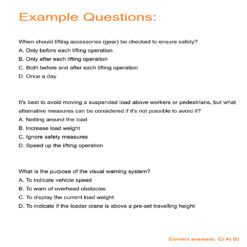RT36 CPCS Blue Card Renewal Mock Test with 139 Questions and Answers / A36 Lorry Loader Hi-ab
£15.00 Original price was: £15.00.£9.95Current price is: £9.95.
Guaranteed Success: Master the Lorry Loader (Hi-ab) CPCS Blue Card Renewal Test with Realistic Practice Questions!
- Questions & Answers: based on the latest RT 36 Lorry Loader – CPCS Renewal Test Revision FACTSHEET
- Categories: A36 Lorry Loader
- You can also renew these extra categories with the same test: A66 Compact Crane / A40 Slinger Signaller
- Number of Multiple-choice Questions: 139
- Format: PDF
- Delivery time: Instant download after checkout
- Refunds: No refunds once downloaded, unless you ordered duplicates by mistake.
If there are any issues with your download, please email CardRenewalTest@gmail.com and we’ll send it ASAP
Master Your CPCS Blue Card Renewal with Our RT36 Lorry Loader Mock Practice Test
Your Road to a 5-Year CPCS Blue Card Renewal Starts Here
Renewing your CPCS (Construction Plant Competence Scheme) blue card for Lorry Loader (Hi-ab) operators is a crucial step to ensure you continue working in the construction sector. The RT36 Lorry Loader CPCS blue card renewal mock practice test we offer on cardrenewaltest.co.uk is your key to mastering the renewal process and securing another 5 years of professional competence.
Why Do You Need Our RT36 Lorry Loader CPCS Blue Card Renewal Mock Practice Test?
Stay Up-to-Date:
The construction industry is dynamic, and regulations evolve. Our mock practice test is designed based on the latest NOCN CPCS RT36 Lorry Loader factsheet, ensuring you stay current with the most relevant information.
Efficient Study Approach:
Reading through lengthy texts can be daunting and time-consuming. Our mock practice test provides a practical, question-and-answer approach, allowing you to absorb essential information without feeling overwhelmed.
Personalized Learning:
Everyone’s learning style is different. Our practice test caters to those who prefer an interactive and engaging learning experience. It’s an ideal supplement to the factsheet, providing a different perspective and reinforcing key concepts.
What Will You Learn from Our RT36 Lorry Loader CPCS Blue Card Renewal Mock Practice Test?
Comprehensive Coverage:
Our mock practice test covers 139 multiple-choice questions derived directly from the latest NOCN CPCS RT36 Lorry Loader factsheet. This comprehensive coverage ensures you’re well-prepared for the actual renewal test.
Realistic Exam Simulation:
Get a feel for the actual CPCS blue card renewal test with our realistic exam simulation. It mimics the format and content of the real test, allowing you to build confidence and reduce test anxiety.
Immediate Feedback:
Receive instant feedback on your performance with detailed explanations for each question. This feature enables you to identify areas that need improvement and focus your study efforts efficiently.
How to Pass Your CPCS Blue Card Renewal Test and Extend Your Blue Card for 5 More Years
- Understand the Factsheet:
- Start by thoroughly reviewing the NOCN CPCS RT36 Lorry Loader factsheet. Understand the key concepts and regulations outlined.
- Practice Regularly:
- Use our RT36 Lorry Loader CPCS blue card renewal mock practice test consistently. Regular practice builds confidence and reinforces your knowledge.
- Identify Weak Areas:
- Pay attention to questions where you struggle. Use the detailed explanations provided to understand the correct answers and the reasoning behind them.
- Simulate Exam Conditions:
- Practice under exam-like conditions to familiarize yourself with the test environment. This will help reduce stress during the actual renewal test.
- Stay Informed:
- Keep an eye on any updates or changes in regulations. Stay informed about industry best practices and safety guidelines.
Don’t Let Your CPCS Card Expire – Act Now!
Embark on your CPCS blue card renewal journey with confidence and competence. Our RT36 Lorry Loader CPCS blue card renewal mock practice test is your trusted companion, offering a user-friendly, effective study experience. Don’t wait – start practicing today and secure your place as a skilled and certified Lorry Loader (Hi-ab) operator for years to come. Renew your CPCS blue card with ease and excellence!
Lorry Loader (RT36) Factsheet Summary:
Preparation and completing work (Preparation):
- Lorry loaders are knuckle-boom loader-type cranes mounted on road vehicle-based chassis for loading and unloading in the construction sector.
- Equipped with stabilisers for static lifting, they can slewing through 360 degrees and vary working radius.
- Operators must perform proper pre-use checks at required intervals on both the vehicle and crane components to ensure safety.
- The operator’s manual outlines checks and inspections, and defects must be reported and addressed before operation.
- Minor faults, if incorrectly diagnosed, could lead to severe issues, emphasizing the need for expert evaluation.
- Regular checks of lifting accessories before and after each operation are essential to prevent damage.
- Legislation mandates lift plans for all operations, identifying risks, mitigation measures, load details, and required lifting accessories.
- Operator awareness and adherence to lift plans are crucial, and any concerns should be immediately communicated to supervisors.
Working safely and with others (Working safely):
- Lifting operations must be segregated from pedestrians, and suspended loads above workers or pedestrians should be avoided.
- Operators must ensure loads are secure before releasing load-restraining gear to prevent unexpected shifts.
- Conditions on-site, proximity to overhead power lines, and compliance with the Road Traffic Act must be considered.
- Vigilance is crucial when traveling on public highways to avoid accidents, especially involving vulnerable road users.
- A rated capacity indicator (RCI) on the loader crane warns operators of approaching or exceeding maximum capacity.
- Operators must establish and check the weight of each load within the loader crane’s rated lifting capacity.
- Loads should be lifted vertically, and any load attached to a structure or embedded in the ground may overload the crane.
- A signaller is required if the operator cannot see the full path of the load, and a code of signals must be agreed upon.
- Stability is paramount, and effective planning for ground conditions, working area, and environmental factors is essential.
- Lorry loaders can only lift loads when the vehicle is level both longitudinally and laterally, and ground conditions must support stabilisers.
- Heavy rain can weaken the ground, affecting stabiliser support, and ground-bearing pressure can be reduced using spreader or support mats.
- The least stable state is when the vehicle has no loads on its carrying platform or bed.
- Limited loading/unloading areas may prevent stabilisers’ full extension, risking vehicle instability, and partial extensions must adhere to manufacturer guidance.
Conclusion:
The RT36 Lorry Loader factsheet underscores the critical importance of thorough preparation, safe working practices, and stability considerations in the operation of lorry loaders. Adhering to regulations, performing proper checks, and maintaining awareness of environmental factors are fundamental to ensuring safety and preventing accidents in lifting operations.
1 review for RT36 CPCS Blue Card Renewal Mock Test with 139 Questions and Answers / A36 Lorry Loader Hi-ab
Add a review Cancel reply
Related products
CPCS Blue Card Renewal Tests
CPCS Blue Card Renewal Tests
RT22 CPCS Blue Card Renewal Mock Test with 144 Questions and Answers / A22 Tracked Loading Shovel
CPCS Blue Card Renewal Tests
RT05 CPCS Blue Card Renewal Mock Test with 105 Questions and Answers / A05 Dragline
CPCS Blue Card Renewal Tests
RT42 CPCS Blue Card Renewal Mock Test with 117 Questions and Answers / A42 Crusher
CPCS Blue Card Renewal Tests
RT49 CPCS Blue Card Renewal Mock Test with 141 Questions and Answers / A49 Loader Securer non STGO
CPCS Blue Card Renewal Tests
RT23 CPCS Blue Card Renewal Mock Test with 125 Questions and Answers / A23 Skid Steer Loader
CPCS Blue Card Renewal Tests
RT30 CPCS Blue Card Renewal Mock Test with 113 Questions and Answers / A30 Piling Rig Tripod
CPCS Blue Card Renewal Tests
RT17 CPCS Blue Card Renewal Mock Test with 144 Questions and Answers / A17 Telescopic Handler

















Lucy –
Highly appreciated. For the price it’s a no brainer being well prepared for the test